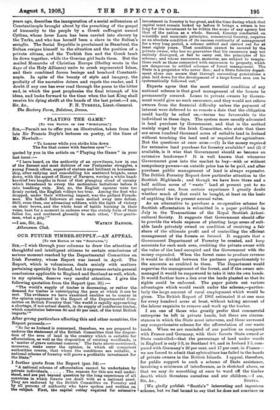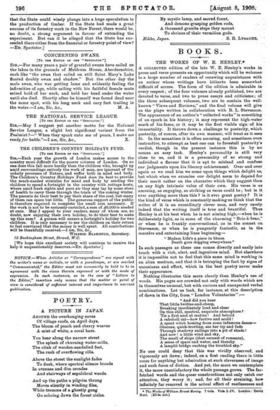OUR FUTURE TIMBER-SUPPLY.—AN APPEAL.
[To ma EDITOR 01 THE " SPRCTATOR."f
SIR,—I wish through your columns to draw the attention of thoughtful and intelligent citizens to certain conclusions of serious moment reached by the Departmental Committee on Irish Forestry, whose Report was issued in April. The Report, which is voluminous, deals mainly with matters pertaining specially to Ireland, but it expresses certain general conclusions applicable to England and Scotland as well, which, in my opinion, deserve very careful attention. I give the following quotation from the Report (par. 31) :— "The world's supply of timber is decreasing, or rather the demand for timber is outstripping the pace at which it can be met. The evidence we have examined enables us to concur in the opinion expressed in the Report of the Departmental Com- mittee on British Forestry that 'the world is rapidly approaching a shortage, if not actual dearth, in its supply of coniferous timber, which constitutes between 80 and 90 per cent, of the total British imports."
After giving particulars affecting this and other countries, the Report proceeds :— "So far as Ireland is concerned, therefore, we are prepared to endorse the statement of the British Committee that the disposi- tion of the area of land in the country which is suitable for afforestation, as well as the disposition of existing woodlands, is a matter of grave national concern.' The facts above-mentioned, moreover, make surer the opinion, in which all competent authorities concur, that where the conditions are suitable, a national scheme of forestry will prove a profitable investment for the State."
I further quote from the Report (par. 54) :— " A national scheme of afforestation cannot be undertaken by
private individuals The reasons for this are well under- stood, and are put beyond question by the long experience of all countries in which forests are dealt with as a national asset. They are endorsed by the British Committee on Forestry and by all persons of authority who have spoken and written on the subject. First, the capital outlay required for extensive investment in forestry is too great, and the time during which that capital must remain locked up before it brings a return is too long for the investment to be within the scope of any agency but that of the nation as a whole. Second, forestry conducted on scientific and economic principles, commercial forestry, requires as an absolute condition of its success continuity of management for a very long period, a scheme settled and carried out for at least eighty years. That condition cannot be secured by the private owner, who has no guarantee that his successors may not entirely disregard, or fail to carry out, the principles of his scheme; and whose successors, moreover, are subject to tempta- tions such as those connected with succession to property, which are dangerous to settled schemes of forest management. The State is a proprietor who never dies ; and a State forestry depart. ment alone can secure that through succeeding generations a plan laid down for the development of a large forest area can be systematically followed out."
Experts agree that the most essential condition of any national scheme is that good management of the forests be permanently assured. Loans to private owners by Govern- ment would give no such assurance, and they would not relieve owners from the financial difficulty unless the payment of interest were deferred to so remote a date that the obligation could hardly be relied on.—terms too favourable to the individual in these days. The system more usually advocated is land purchase by Government, and that is the method mainly urged by the Irish Committee, who state that there are seven hundred thousand acres of suitable land in Ireland without touching the land used or required for agriculture. But the questions at once arise :—(1) Is the money required for extensive land purchase for forestry available ? and (2) if available, is it wise that Government should so become an extensive landowner ? It is well known that whenever Government goes into the market to buy—with or without compulsory powers—an outside price has to be paid, and after purchase public management of land is always expensive. The British Forestry Report drew particular attention to the Scottish Highlands ; and though we have here three and a half million acres of " waste " land at present put to no agricultural use, from certain experience I greatly doubt whether much of that could be bought, at least on the basis of anything like its present annual value.
As an alternative to purchase a co-operative scheme for Scottish afforestation is submitted in a paper published in July in the Transactions of the Royal Scottish Arbori- cultural Society. It suggests that Government should offer to provide the whole expense of planting large areas of suit- able lands privately owned on condition of receiving a fair share of the ultimate profit and of controlling the efficient management of the forests so formed. It suggests that a Government Department of Forestry be created, and keep accounts for each such area, crediting the private owner with the value of the land occupied and the Government with the money expended. When the forest came to produce revenue it would be divided between the partners proportionately to the amounts so credited to them. The Department would supervise the management of the forest, and if the owner mis- managed it would be empowered to take it into its own hands. It would further have a lien over the lands planted so that its rights could be enforced. The paper points out various advantages which would result under the scheme,—particri- larly the large amount of rural employment which would be given. The British Report of 1902 estimated it at one man for every hundred acres at least, without taking account of the labour requisite to remove and work up the timber.
I am one of those who greatly prefer that commercial enterprise be left in private hands, but there are circum- stances in which the State must intervene, and these surround any comprehensive scheme for the afforestation of our waste lands. When we are reminded of our position as compared with France and Germany, with their forests State owned or State controlled—that the percentage of land under woods in England is only 5.3, in Scotland 4.6, and in Ireland 1-5, com- pared with Germany's 26 per cent. and 17 per cent. in France— we are forced to admit that sylvieulture has failed in the hands of private owners in the British Islands. I appeal, therefore, for public support to such a scheme of State assistance, involving a minimum of interference, as is sketched above, so that we may do something at once to ward off the timber dearth which threatens ourselves and our children.—I am, Sir, &c,, Scona. [We gladly publish "Scotia's" interesting and ingenious scheme, but we feel bound to say that he does not convince us that the State could wisely plunge into a huge speculation in the production of timber. If the State had made a great success of its forestry work in the New Forest, there would be, no doubt, a strong argument in favour of extending the experiment. But can it be alleged that the State has suc- ceeded there either from the financial or forestry point of view? —ED. Spectator.]



































 Previous page
Previous page